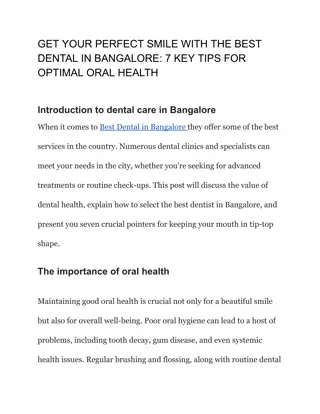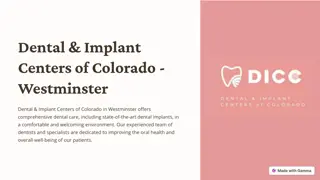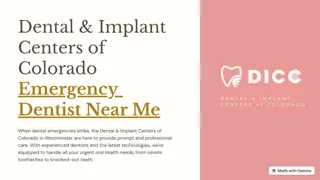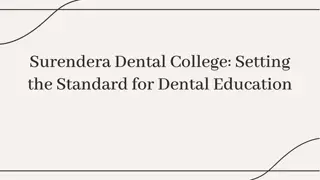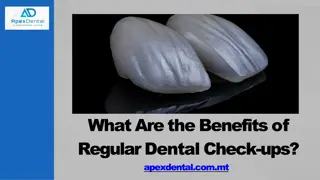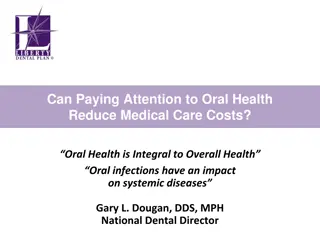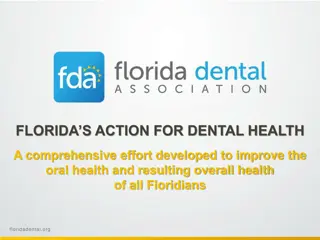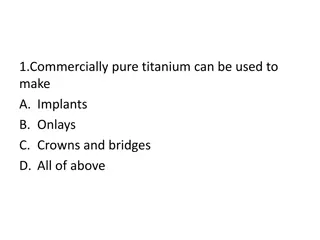The Importance of Regular Dental Visits for Overall Health
Regular dentist visits are crucial for maintaining good oral health, but they also play a significant role in assessing overall health. The condition of your mouth can provide insights into your body's health status. Poor oral health can lead to various problems, including oral and facial pain, heart issues, digestion problems, and more. Additionally, the damaging effects of consuming sugary, carbonated drinks like soda on teeth are comparable to those of illicit drugs. Dentists emphasize the critical link between oral health and overall well-being, highlighting the need for preventive dental care.
Download Presentation

Please find below an Image/Link to download the presentation.
The content on the website is provided AS IS for your information and personal use only. It may not be sold, licensed, or shared on other websites without obtaining consent from the author.If you encounter any issues during the download, it is possible that the publisher has removed the file from their server.
You are allowed to download the files provided on this website for personal or commercial use, subject to the condition that they are used lawfully. All files are the property of their respective owners.
The content on the website is provided AS IS for your information and personal use only. It may not be sold, licensed, or shared on other websites without obtaining consent from the author.
E N D
Presentation Transcript
Taking Taking Care of your Mouth Care of your Mouth
Why is it in Important to see your Dentist Regular dentist visits can do more than keep your smile attractive they can also tell dentists a lot about your overall health, including whether or not you may be at risk for chronic disease. New research suggests that the health of your mouth mirrors the condition of your body as a whole. For example, when your mouth is healthy, chances are your overall health is good, too. On the other hand, if you have poor oral health, you may have other health problems.
Poor oral health can lead to problems If you don't take care of your teeth and gums, your poor oral hygiene can actually lead to other health problems, including:
Oral and facial pain. According to the Office of the Surgeon General, this pain may be largely due to infection of the gums that support the teeth and can lead to tooth loss. Gingivitis, an early stage of gum disease, and advanced gum disease affect more than 75% of the U.S. population. Problems with the heart and other major organs. Mouth infections can affect major organs. For example, the heart and heart valves can become inflamed by bacterial endocarditis, a condition that affects people with heart disease or anyone with damaged heart tissue. Digestion problems. Digestion begins with physical and chemical processes in the mouth, and problems here can lead to intestinal failure, irritable bowel syndrome and other digestive disorders.
How Soda Damages Your Teeth A combination of sugars, carbonation, and acids within the beverages are credited with the dental damage, so much so that the Mississippi State Department of Health calls soft drink consumption one of several leading causes of tooth decay. Sugar, carbonation, and acids weaken tooth enamel, the protective covering on your teeth. They also encourage the growth of bacteria in the mouth. Without enamel protecting your teeth, these bacteria can do significant damage.
What Dentists are saying Dentists have also found that the effects of soda on teeth are strikingly similar to the effects of methamphetamine or crack on teeth. Drinking more than a soda a day raises the risk thatacids found in many soft and energy drinks will eat away at your tooth enamel and its pearly white color.
Something to think about Coke can be used to clean car battery terminals; the slight acidity does not react with battery acid, so you can pour it over the battery and let it wash away corrosion. Coke can also be used to defrost a frozen windshield, and a liberal amount of cola poured over the windshield and bumper can help remove bugs and road debris
Many people are now drinking bottled tea beverages and have been given the impression through marketing and packaging that these drinks represent a healthful alternative to soda. They are not. Many of these (sweetened tea beverages) are little more than sugar water. They contain small amounts of tea and lots of added sweeteners. One 20 oz bottle of sweetened tea often contains more than 200 calories. If you drink an average of one bottle of tea daily, that is 20 pounds of calories a year just from tea.
What you can do. Seeing a dentist regularly helps to keep your mouth in top shape and allows your dentist to watch for developments that may point to other health issues. A dental exam can also detect poor nutrition and hygiene, growth and development problems and improper jaw alignment. Provide your dentist with a complete medical history and inform him or her of any recent health developments, even if they seem unrelated to your oral health.
At home, you can practice good oral hygiene: Brush twice a day for at least two minutes, using fluoridated toothpaste. Floss daily to remove plaque from places your toothbrush can't reach. Eat a healthy diet to provide the nutrients necessary (vitamins A and C, in particular) to prevent gum disease.
Avoid cigarettes and smokeless tobacco, which are known to contribute to gum disease and oral cancer. Visit the dentist regularly for cleanings and exams. This is one of the most effective ways to detect the early signs of gum disease.
Dr Perkins recommends Everyone should have a bottle of ACT mouthwash. It is a daily flouridated rinse that can make a huge impact on the strength of your enamel Flouride application every 6 months by your dental hygeinist!!! ADA says children and adults must have flouride treatments! No more than 1 soda or tea a day!! And DO NOT SIP on it!! Drink it and be done with it! Sealants!!! Not just for kids! They protect the grooves in our back teeth from getting cavities.
Sealants protect the surface of your teeth from cavities. Just ask Austin Powers
TEETH ARE AMAZINGLY STRONG, but they can't repair themselves. However, with proper care and protection they can last a lifetime They sure are handy when you smile. So keep your teeth around a while!
EDUCATION Start AT HOME What are you providing for your children?? Giving our children sodas and tea is creating caffeine addictions as well as contributing to the rising number of children affected by obesity, heart disease and diabetes Lead by example!! Realize that we are responsible for our health and teeth! If you are not seeing your dentist every 6 months, you likely have cavities, possible gum disease, and other health problems that are going undiagnosed.









